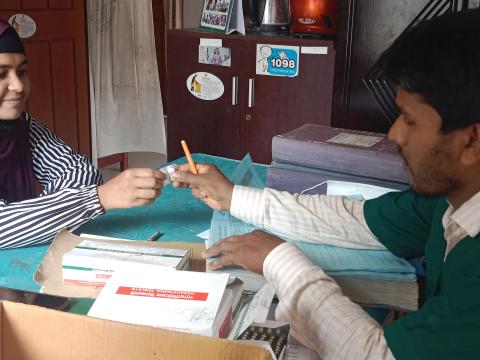Periods are only bad when we refuse to talk about it

“I suffered for ten years because I did not know how to take care of myself during my periods,” said Razia, 21.
Razia lives with her parents in a small village in Satkhira district. Razia began menstruating at the age of 11 and faced a lot of health issues since because her family, especially the women in her family, lacked the knowledge necessary to guide her. Women and girls in many rural communities of Bangladesh suffer health issues because menstruation is viewed with shame and Sexual and Reproductive Health and Rights (SRHR) are not openly discussed.
“I was so scared when I got my period. When I told my mother, she told me not to tell anyone and she gave me some cloth to use as napkins. She told me I needed to wash the cloth in secret and keep it hidden away where no one can see it. My grandmother asked me not to go out of the house, not even to take a bath!” Razia said.
Part of the Youth Empowered Project’s activities is to form youth clubs in its working areas for young people not enrolled in schools or colleges. These clubs train young people on gender norms, create linkages for them with different services, warn them about the risk of child marriage and how to report or prevent child marriages in their communities, and encourage them to return to school. The clubs also take sessions on SRHR and discuss ways for adolescents to stay safe from STDs and STIs. When Razia heard about these sessions, she became interested and joined the club in August 2022. At first, she was hesitant to talk about her problems, but persistent counseling from the session facilitators finally helped her open up about her menstrual health concerns with a community facilitator. The community facilitator took her to a Community Health Care Provider (CHCP) at the community clinic nearby.
The CHCP advised Razia on the ways to stay healthy during her period. He told her to use sanitary napkins or, if she had no other option other than using cloth, to wash them properly and dry them in direct sunlight. He also provided Razia with medication and also counseled Razia to alleviate her fears.
“I had no idea these free services were available at the community clinic, this was the most useful information for me,” says Razia.
Razia now lives a healthy and normal life because she knows how to properly care for herself. Like Razia, many adolescents have learned how to properly care for their health and speak freely about their illnesses with community healthcare providers. This is all thanks to what they have learned at the Youth Empowerment Project’s youth clubs.